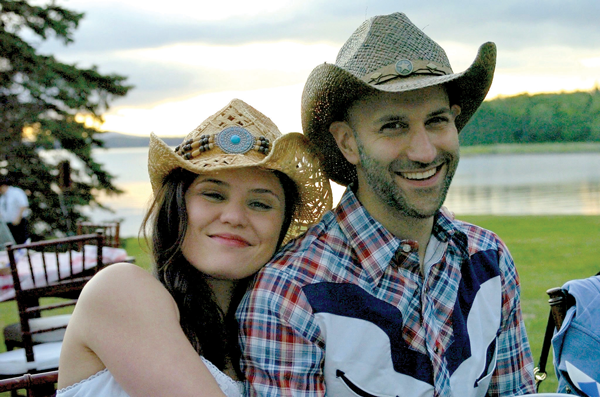On May 7, 2019, the Asthma and Allergy Foundation of America (AAFA) released our 2019 Asthma Capitals™ report. In the report, we look at three asthma outcomes in cities across the U.S.: asthma prevalence, asthma-related emergency department visits and deaths from asthma.
About 3,600 people die each year due to asthma. That’s about 10 each day. And that’s 10 too many. The people at greatest risk of dying from asthma are black Americans, seniors and women.
In the essay below, you’ll hear from Peter DeMarco of Boston, Massachusetts, who lost his wife, Laura Levis, to asthma. Boston ranks #8 on our 2019 Asthma Capitals report. It has such a high ranking because of a high number of people with asthma and asthma-related deaths.
This Is What Laura Would Tell You About Asthma, If She Could
By Peter DeMarco, Laura’s husband, of Boston, Massachusetts (overall #8 on Asthma Capitals)
Laura was afraid of heights – so she insisted we hike the highest mountains. It wasn’t enough for her to just lift weights at the gym: she had to enter women’s powerlifting competitions. To land her dream job at Harvard University, she endured nine exhausting rounds of interviews.
Laura thrived on challenges, so it’s no surprise that’s how she approached her asthma. It was just another challenge she needed to overcome.
I think that is why she decided to walk alone to the hospital the morning her attack struck. She was staying only a few blocks away, so she knew she’d be there in a couple of minutes, faster than calling an Uber. It was 4 a.m., and I wasn’t there, so maybe she felt embarrassed about waking someone else up to ask for help.
Laura had dealt with asthma for nearly 10 years, so she thought she knew what to expect – she could almost sense when a heavy pollen day, or extreme humidity, or a very dusty room might trigger it. When an attack did become severe, we always made it in plenty of time to an emergency room or to an all-night CVS pharmacy for nebulizer fluid. I would usually have to prod her to go though; she always thought her attack would subside if we just gave it another few minutes.
She always believed she could beat it herself.

Laura was so confident that September morning – so sure this would be just “another” attack – that she threw gym clothes into her backpack, perhaps thinking she could get in an early workout once she left the hospital. Nevertheless, she must have been so relieved when she reached the emergency room door.
But Laura did not beat her asthma that morning, because something terrible happened. Something she could never in her life have anticipated. The hospital door was locked, and there was no one in sight to let her into the emergency room.
Everything that could have gone wrong for Laura did go wrong that morning. The hospital security desk was left unattended all night … her 911 distress call was mishandled … those responsible for finding Laura went to the wrong hospital door. All unexpected. All beyond Laura’s control.
You can read more if you wish in the Boston Globe in a story called “Losing Laura,” which I wrote. Laura was just 34 years old, and now I am her widowed husband.
I have written this essay for the Asthma and Allergy Foundation of America because Laura can’t have died for no reason. Her story just has to save someone else’s life.
So this is my message to you – no, this is Laura’s message to you:
Nothing is truly in your control until your asthma is back under control.
Please, please, please factor in the unexpected. Make it your mantra. Your inhaler could have a defective cartridge. You could be stuck in standstill traffic due to an accident. The hospital door you try could be locked, with no one in sight. It’s not about what you know from past attacks. It’s what you don’t know about the next one.
When an attack strikes, don’t be alone – tell someone as soon as you can. Don’t be embarrassed to ask for help or think that by telling someone you are letting asthma win. Without oxygen, you have between three and six minutes to live. Telling someone you’re having an attack could save your life. That is how you beat asthma, by living.
By living.

I wish more than anything in the world that Laura had done that. If only she’d woken up the person she was staying with. If only she’d dialed 911 the moment her attack turned severe. If only she’d called me.
It has been just over two and a half years since her attack. You cannot imagine what it is like to lose the person you love to asthma. Tears are falling onto my keyboard as I type this.
So please, remember my wife. Remember Laura Beth Levis. But more importantly, remember her message.
When an attack strikes, tell someone.
Don’t be alone.
Don’t die alone.
What can we do to reduce asthma deaths? Having your asthma under control greatly reduces the risk of dying from asthma. If you have asthma, see an asthma specialist, such as an allergist or pulmonologist, to help you come up with an asthma management plan. This includes:
- Taking asthma medicines as prescribed
- Avoiding or reducing exposure to asthma triggers
- Learning the signs of an asthma episode or attack
- Following your Asthma Action Plan and acting quickly when you start having symptoms (tell people around you about your asthma and your Asthma Action Plan!)
You can also advocate on a local and national level for protections for people with asthma. Here are just a few ways you can help improve asthma in your area:
- Share our Asthma Capitals report with local leaders, politicians, schools and health care providers
- Sign up for AAFA’s online community to opt-in to be a patient spokesperson, and take action on our advocacy alerts
- Reduce your contribution to air pollution
- Vote for asthma-friendly policies
- Spread awareness on your personal social media account
- Support AAFA’s mission
Every effort you make matters. But it’s more effective if we all work together. Join us during National Asthma and Allergy Awareness Month to spread awareness about asthma. Encourage those around you to do the same. When everyone understands asthma better, we can all work to create more asthma-friendly schools, workplaces and communities.



Comments (3)